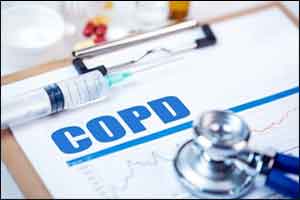- Home
- Editorial
- News
- Practice Guidelines
- Anesthesiology Guidelines
- Cancer Guidelines
- Cardiac Sciences Guidelines
- Critical Care Guidelines
- Dentistry Guidelines
- Dermatology Guidelines
- Diabetes and Endo Guidelines
- Diagnostics Guidelines
- ENT Guidelines
- Featured Practice Guidelines
- Gastroenterology Guidelines
- Geriatrics Guidelines
- Medicine Guidelines
- Nephrology Guidelines
- Neurosciences Guidelines
- Obs and Gynae Guidelines
- Ophthalmology Guidelines
- Orthopaedics Guidelines
- Paediatrics Guidelines
- Psychiatry Guidelines
- Pulmonology Guidelines
- Radiology Guidelines
- Surgery Guidelines
- Urology Guidelines
Beta blockers lower mortality risk in COPD patients after heart attack

Taiwan: Patients with COPD receiving β-blockers after acute myocardial infarction (AMI) have reduced mortality risk, finds a new study published in the PLOS ONE. β-blockers also did not increase the risk of COPD exacerbations.
COPD patients less often receive β-blockers after acute myocardial infarction. This may influence their outcomes after AMI. Tse-Hsuan Su, Departments of Emergency Medicine, Chang Gung Memorial Hospital Linkou, Taoyuan, Taiwan, and colleagues evaluated the efficacy of β-blockers after AMI in patients with COPD, compared with non-dihydropyridine calcium channel blockers (NDCCBs) and absence of these two kinds of treatment.
The researchers conducted a nationwide population-based cohort study using data retrieved from the Taiwan National Health Insurance Research Database. Participants included 28,097 patients with COPD who were hospitalized for AMI between January 2004 and December 2013. After hospital discharge, 24,056 patients returned to outpatient clinics within 14 days (the exposure window). 302 patients who received both β-blockers and NDCCBs were excluded, leaving 23,754 patients for analysis. 10,638, 44.8% of them were classified into β-blocker group, 1,747, 7.4% in the NDCCB group and 11,369, 47.9% in the control group.
Also Read: Do All Patients Need β-Blockers After a Heart Attack?
Key Findings:
- The β-blockers group of patients had lower overall mortality risks (adjusted hazard ratio [95% confidence interval]: 0.91 [0.83–0.99] versus the NDCCB group; 0.88 [0.84–0.93] versus the control group), but the risk of major adverse cardiac events within 1 year was not statistically different.
- β-blockers decreased risks of re-hospitalization for COPD and other respiratory diseases by 12–32%.
Also Read: Use of Beta Blockers associated with reduced risk of death from COPD
"The use of β-blockers was associated with a lower mortality rate in patients with COPD after AMI. β-blockers were not associated with an increased risk of hospitalization for COPD or respiratory diseases, even in patients with severe COPD," the authors write.
"However, the use of β-blockers did not decrease the occurrence of MACE within 1 year after MI in our patient cohort," they further added.

Disclaimer: This site is primarily intended for healthcare professionals. Any content/information on this website does not replace the advice of medical and/or health professionals and should not be construed as medical/diagnostic advice/endorsement or prescription. Use of this site is subject to our terms of use, privacy policy, advertisement policy. © 2020 Minerva Medical Treatment Pvt Ltd